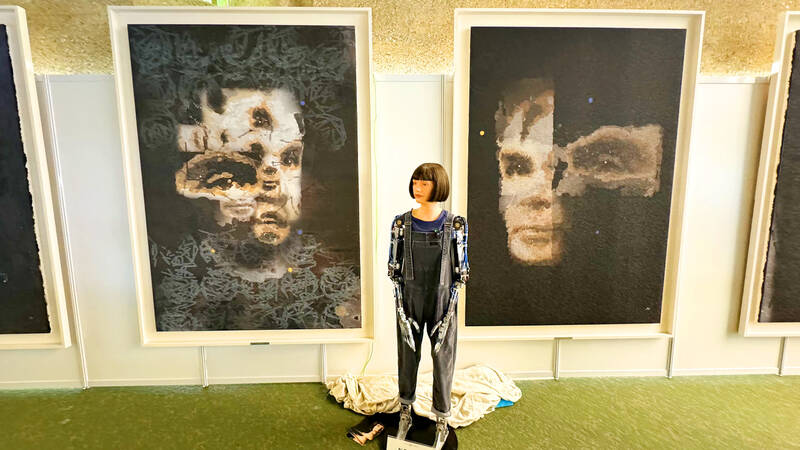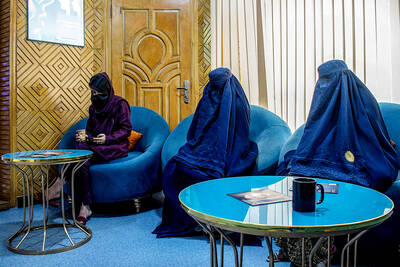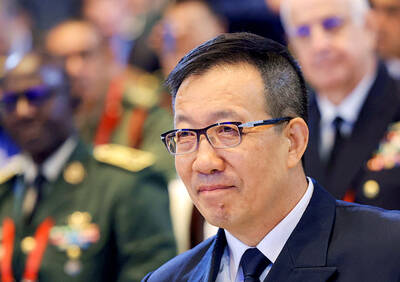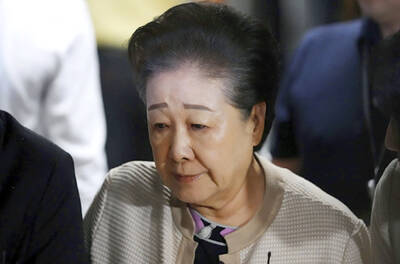A portrait of English mathematician Alan Turing became the first artwork by a humanoid robot to be sold at auction, fetching US$1.32 million on Thursday.
The 2.2m portrait A.I. God. Portrait of Alan Turing by “Ai-Da,” the world’s first ultra-realistic robot artist, smashed pre-sale expectations of US$180,000 when it went under the hammer at London auction house Sotheby’s Digital Art Sale.
“Today’s record-breaking sale price for the first artwork by a humanoid robot artist to go up for auction marks a moment in the history of modern and contemporary art and reflects the growing intersection between AI [artificial intelligence] technology and the global art market,” the auction house said.

Ai-Da Robot, which uses AI to speak, said: “The key value of my work is its capacity to serve as a catalyst for dialogue about emerging technologies.”
“[This] portrait of pioneer Alan Turing invites viewers to reflect on the god-like nature of AI and computing while considering the ethical and societal implications of these advancements,” Ai-Da said.
The ultra-realistic robot, one of the most advanced in the world, is designed to resemble a human woman with a face, large eyes and a brown wig.
Ai-Da is named after Ada Lovelace, the world’s first computer programmer, and was devised by Aidan Meller, a specialist in modern and contemporary art.
“The greatest artists in history grappled with their period of time, and both celebrated and questioned society’s shifts,” Meller said.
“Ai-Da Robot as technology, is the perfect artist today to discuss the current developments with technology and its unfolding legacy,” he added.
Ai-Da generates ideas through conversations with members of the studio, and suggested creating an image of Turing during a discussion about “A.I. for good.”
The robot was then asked what style, color, content, tone and texture to use, before using cameras in its eyes to look at a picture of Turing and create the painting.
Meller led the team that created Ai-Da with AI specialists at the universities of Oxford and Birmingham in England.
Meller said Turing, who made his name as a World War II codebreaker, mathematician and early computer scientist, had raised concerns about the use of AI in the 1950s.
The artwork’s “muted tones and broken facial planes” seemingly suggested “the struggles Turing warned we will face when it comes to managing AI,” he said.
Ai-Da’s works were “ethereal and haunting” and “continue to question where the power of AI will take us, and the global race to harness its power,” he added.

Decked out with fake crystal chandeliers and velvet sofas, cosmetic surgery clinics in Afghanistan’s capital are a world away from the austerity of Taliban rule, where Botox, lip filler and hair transplants reign. Despite the Taliban authorities’ strict theocratic rule, and prevailing conservatism and poverty in Afghanistan, the 20 or so clinics in Kabul have flourished since the end of decades of war in the country. Foreign doctors, especially from Turkey, travel to Kabul to train Afghans, who equally undertake internships in Istanbul, while equipment is imported from Asia or Europe. In the waiting rooms, the clientele is often well-off and includes men

BEIJING FORUM: ‘So-called freedom of navigation advocated by certain countries outside the region challenges the norms of international relations,’ the minister said Chinese Minister of National Defense Dong Jun (董軍) yesterday denounced “hegemonic logic and acts of bullying” during remarks at a Beijing forum that were full of thinly veiled references to the US. Organizers said that about 1,800 representatives from 100 countries, including political, military and academic leaders, were in Beijing for the Xiangshan Forum. The three-day event comes as China presents itself as a mediator of fraught global issues including the wars in Ukraine and Gaza. Addressing attendees at the opening ceremony, Dong warned of “new threats and challenges” now facing world peace. “While the themes of the times — peace and development —

COMFORT WOMEN CLASH: Japan has strongly rejected South Korean court rulings ordering the government to provide reparations to Korean victims of sexual slavery The Japanese government yesterday defended its stance on wartime sexual slavery and described South Korean court rulings ordering Japanese compensation as violations of international law, after UN investigators criticized Tokyo for failing to ensure truth-finding and reparations for the victims. In its own response to UN human rights rapporteurs, South Korea called on Japan to “squarely face up to our painful history” and cited how Tokyo’s refusal to comply with court orders have denied the victims payment. The statements underscored how the two Asian US allies still hold key differences on the issue, even as they pause their on-and-off disputes over historical

BRIBERY ALLEGATIONS: A prosecutor said they considered the risk of Hak-ja Han tampering with evidence to be very high, which led them to seek the warrant South Korean prosecutors yesterday requested an arrest warrant for the leader of the Unification Church, Hak-ja Han, on allegations of bribery linked to the country’s former first lady and incitement to destroy evidence. The move came a day after the 82-year-old was questioned over her alleged role in bribing former first lady Kim Keon-hee and a lawmaker. Founded in 1954 by her late husband, Sun Myung Moon, the Unification Church has long been the subject of controversy and criticism, with its teachings centered on Moon’s role as the “second coming” and its mass weddings. Followers are derisively referred to as “Moonies.” However, the church’s